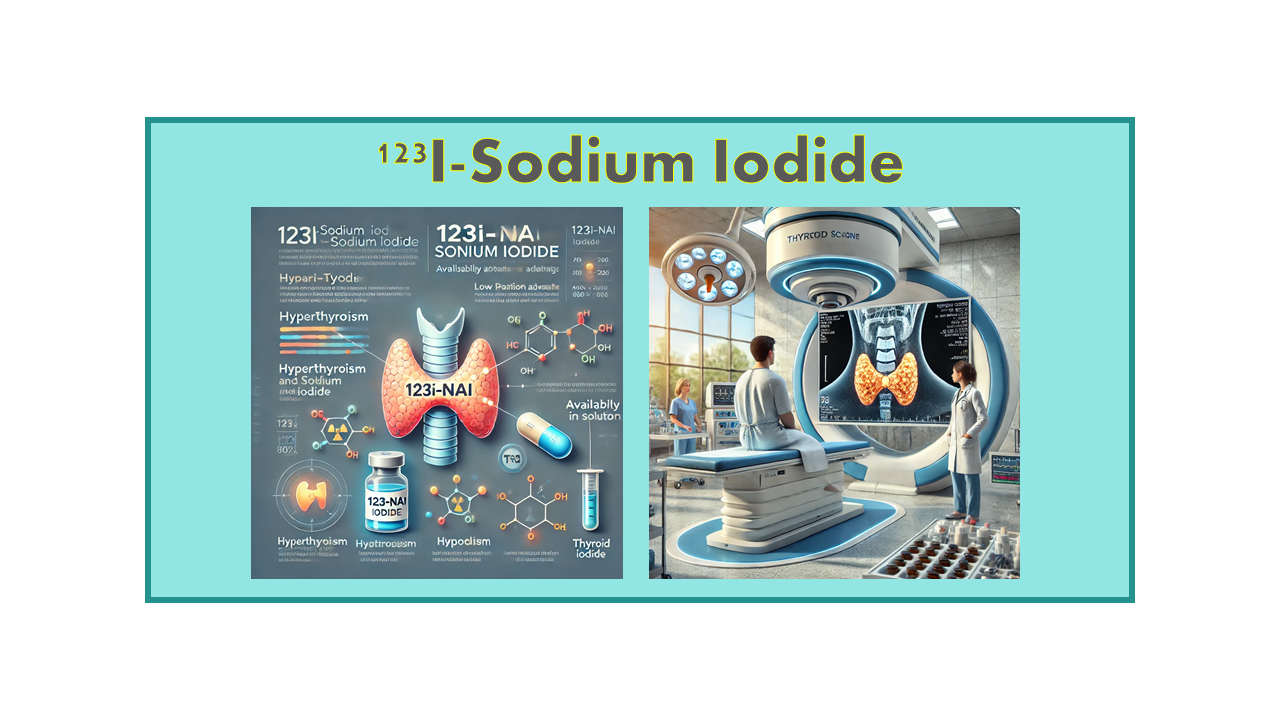
123I-Sodium Iodide
December 24, 2024
Description
123I-Sodium Iodide (123I-NaI) is a well-established radioactive salt utilized primarily for imaging the thyroid gland, thyroid cancer cells, and metastases. This generic tracer has been a cornerstone in nuclear medicine, specifically in thyroid diagnostics. Developed decades ago, it is a key tool for evaluating thyroid function and identifying thyroid-related malignancies. Unlike its therapeutic counterpart 131I-Sodium Iodide, 123I-NaI is used exclusively as a diagnostic imaging agent, specifically in Single Photon Emission Computed Tomography (SPECT).
Clinical Applications
123I-Sodium Iodide is considered one of the best tracers for morphological and functional studies of the thyroid gland. Its applications include:
- Evaluation of Thyroid Function:
- Diagnosing and managing hyperthyroidism and hypothyroidism.
- Assessing the morphology and activity of thyroid tissues.
- Thyroid Cancer Diagnostics:
- Detection of iodine-avid thyroid cancer cells and metastatic lesions.
Key features of 123I-Sodium Iodide include:
- Superior photon flux: 123I produces approximately 20 times more photons than 131I for the same administered dose, enhancing imaging quality.
- Lower radiation burden: The radiation dose to the thyroid is only about 1% of that from 131I, making 123I a safer alternative for patients whenever available.
Dosing: The typical diagnostic dose ranges from 1 to 4 mCi, administered in the form of capsules or solutions.
Availability
123I-Sodium Iodide is widely distributed by major radiopharmaceutical manufacturers, although regional variations in availability exist. Providers include:
- Cardinal Health (capsules, except the 400 µCi variant discontinued in 2013).
- FUJIFILM (RadioCap).
- GE Healthcare (approved in 1976 but discontinued in 2011).
- IBA Molecular (Curium) (I-123-S-2).
- International Isotopes Inc. (since 2020).
- Mallinckrodt (Curium) (approved in the US in 1989).
- Nihon Medi System (Iodine Capsules).
Pricing:
- In Europe, the cost is typically €200-350 per mCi.
- In the USA (2020 data), a diagnostic dose costs approximately $200.
Competition
Iodine isotopes dominate thyroid imaging due to their specificity for iodine-avid cells. However, several alternatives are available, each with distinct features and limitations:
- 131I-Sodium Iodide:
- Primarily used for therapeutic purposes but can be employed for imaging at low doses.
- Emits both beta and gamma radiation, making it less optimal for pure imaging but significantly more cost-effective.
- 124I-Sodium Iodide:
- A PET imaging agent offering enhanced resolution compared to SPECT tracers.
- Limited by its long half-life and higher radiation dose to patients.
While these products provide alternatives, 123I-Sodium Iodide remains the preferred tracer for pure diagnostic purposes due to its superior imaging capabilities and lower radiation exposure.
Comments and Future Considerations
Thyroid and iodine-avid cancer cells naturally concentrate iodine, enabling precise imaging through the administration of radioactive iodine. However, this process presents unique challenges:
- Thyroid Blockade:
- Non-thyroid-targeting radioiodinated molecules can release free iodine during metabolism, potentially being trapped by the thyroid. To prevent unintended uptake, a blockade using “cold” iodine is required prior to the administration of tracers or drugs.
- Behavior of Related Halogens:
- While iodine is the primary target, other halogens such as bromine (to a lesser extent) and astatine can also be trapped by the thyroid. Future developments in astatine-labeled molecules must account for this behavior, as astatine salts could play a role in the treatment of thyroid cancers.
Outlook
The high specificity and safety profile of 123I-Sodium Iodide ensure its continued use in thyroid imaging, though its high production cost and limited sources remain challenges. Research into alternative imaging agents, such as 124I for PET or emerging therapies involving astatine, may expand the diagnostic and therapeutic options available for thyroid-related conditions. Nonetheless, 123I-Sodium Iodide remains an invaluable tool in both clinical and research settings.